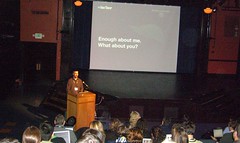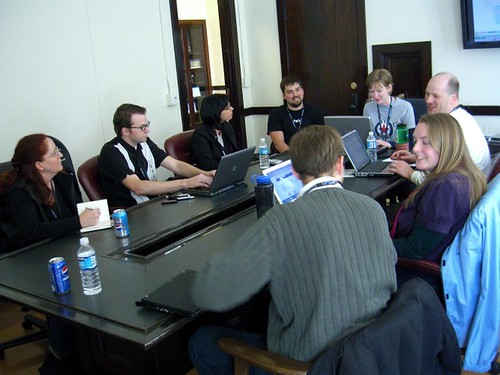The first session I attended at InfoCamp 2007 was titled "Gateways to Information" presented by Justin Otto, a librarian at Eastern Washington University. He was primarily interested in investigating how to bring the often vast information resources at libraries to library patrons. In fact this is a topic of interest to many of this weekend's participants, many of whom are librarians.

The session was part feedback session for EWU's library website, and part general discussion on accessing large amounts of information from many different (and often walled-garden style) data stores.
Consider the many kinds of information available at a library:
- Library Catalogue
- Research Databases (such as JSTOR and ProQuest)
- Subject Guides
- Library Events
- Information About Local Organizations
It seems as if most of these libraries traditionally present the user with lists of links (dozens), sometimes categorized, but typically along single dimensions (such as subject areas). Often there are search facilities, but either the search is not a unified or federated one (meaning you must already know what data store you're searching under first) or the search facility provides poorly ranked results (perhaps due to poor result integration).
My fellow session participants and I came up with a few general principles which we find useful:- Unified Search
- Make all information from the library (events, catalog, research databases, etc.) available from a single search interface, with high quality results integration. Make this search facility available on every single page.
- Bread Crumbs
- Someone brought up Steve Krug's infamous Don't Make Me Think with respect to his comments on creating a bread crumb trail to help users navigate a site.
- Card Sort Analysis
- This is one I hadn't heard of before, but someone suggested placing content areas on cards, handing the cards to users, and asking them to categorize the content into a hierarchy. Given the amount of content at a library and its complex relationships, this seems like an excellent technique to get a feel for how users might want to navigate subject areas.

I stayed for a second session on Information Technology in Rural Libraries given by Whitney Edwards, Elliot Edwards, and Katy Herrick of the Libraries of Stevens County in Eastern Washington. It sounds like they're addressing some interesting problems with some innovative techniques.
Stevens County has nine very rural libraries, each with different resources and its own collection. The population of Stevens county is technologically literate (seemly very much so!); however, the internet service opportunities in Stevens County seem to be limited. Most patrons of the library have only dial-up access.
Whitney and her colleagues provide several important services to their community. A very popular one is high-speed internet access (available wirelessly). The Stevens County librarians also maintain a wiki for the library that also performs as a local organization repository.

1 comment:
oh great Nickster:
1. why didn't i know about this event? Why wasn't I there with you?
2. yes, libraries need to provide unified access to their data stores. Absolutely. One of the biggest problems is the !#$#!$ proprietary scholarly publishing (e.g. journal articles) and the @!#$#!@$ proprietary databases. My best solutions so far:
1. Stop the world. Have the tenure process insist on open access journals, so libraries could get full text access to any material of interest.
2. Negotiate with providers of said databases and journals. If they won't share full text info (or even metadata) at reasonable prices, then ...
3. Provide software so journals and databases can easily provide a read-only lucene index to libraries (or access to it) so libraries can include the information in the single search, even without direct access to the full text.
4. Libraries need to stop discarding all their usage data that would tell them about usage patterns of individuals. It's a gold mine of info that libraries throw away. Look what amazon does with it!!!! Yes, there are privacy issues. But I predict many many library users would be willing to have their usage data collected to improve library services. How many people are reading about how to make nuclear bombs or otherwise do evil deeds?
Not that this stuff is my job, or anything ...
Post a Comment